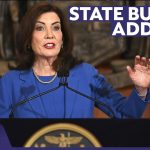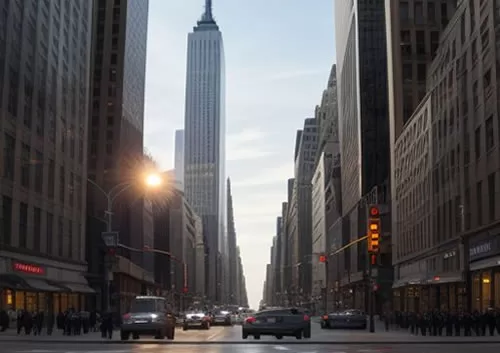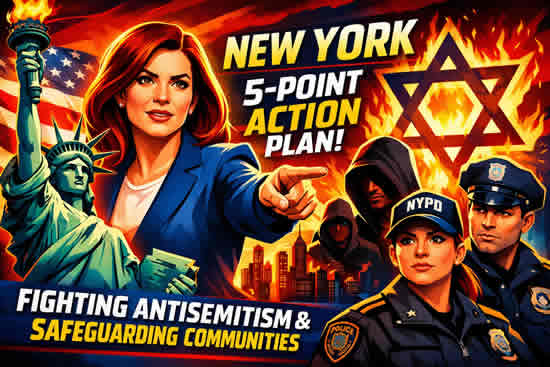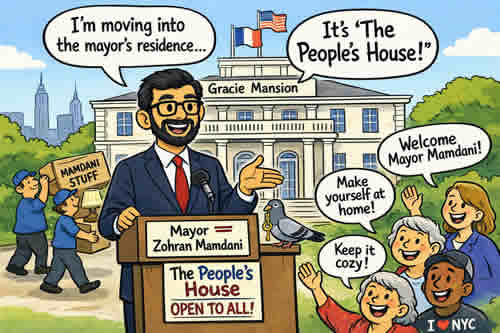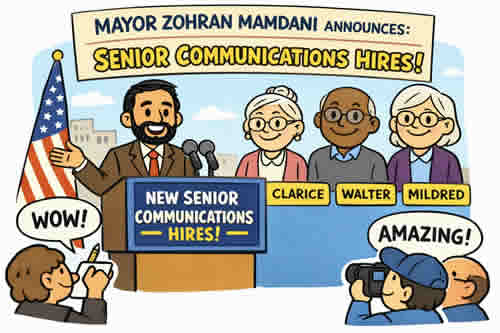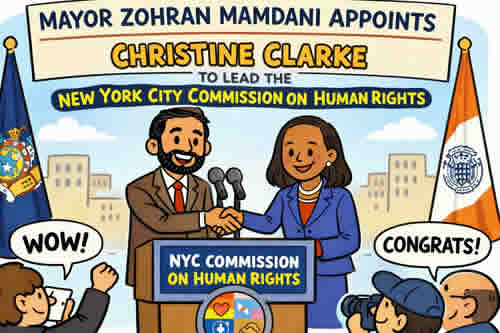During the interview, Mayor Adams discussed:
- Budget cuts to NYC Parks: Adams urged citizens to wait for the final budget, stating that people often stress unnecessarily before the budget is finalized. He assured that they would navigate challenges without laying off teachers or civil servants, or raising taxes.
- NYPD overtime budget: The mayor defended the high police overtime budget, citing the need for safety due to numerous protests and gun violence issues. He emphasized keeping New York the safest big city in America.
- Accessibility to constituents: Adams refuted claims of neglecting certain boroughs, particularly the Bronx, stating he spends significant time there. He highlighted his administration’s accessibility through town halls and regular radio appearances.
- Local community hiring initiative: Adams announced a new program requiring private companies with city contracts to hire locally from NYCHA and low-income communities. He mentioned a $1.2 billion initial investment, with plans to expand.
- Addressing unemployment: The mayor claimed his administration has cut Black unemployment in half, bringing it below 8% for the first time since 2019.
- Cell phone ban in schools: Adams expressed support for potentially banning cell phones in schools, citing distractions and bullying concerns. However, he acknowledged the need for careful implementation and consideration of parental concerns.
Throughout the interview, Mayor Adams emphasized his administration’s achievements in areas such as education, crime reduction, and improving conditions for working-class New Yorkers.
Tarsha Jones: On the line, we have the mayor of New York City, Honorable Eric Adams. Hey, good morning. How are you?
Mayor Eric Adams: Great, great. Good to speak with you.
Wayne Mayo: Yes, we haven’t talked to you in a while.
Jones: I know, we’ve been missing each other.
Mayor Adams: We sure have. It’s all good.
Jones: Listen, they’ve been cornering me in those streets for not asking you the tough questions.
Mayor Adams: I love any questions. There’s no such thing as tough questions.
Jones: I know, and you would be great with it, but I have to first ensure my spot at the mayor’s ball. Balling all, balling all. When said ball happens I’d like to ensure that my band is the performer of the night.
Mayor Adams: You know what, that’s done. Tough questions or not. I ask tough questions every day.
Jones: Yay, yay. All right, so people are pissed about your proposed $55 million cut from the NYC Parks. They feel like their local parks, where they can relax, work out, and enjoy, are being neglected. They feel that the impact on climate change is another reason that we need our city parks. They also, well, we’ll start there.
Mayor Adams: I think people should wait until the final budget is done. This is really the budget negotiation period now with the City Council. Every year, if you were to go back and look at all of this energy and angst that happens before the budget is done, just for us to finalize the budget and everyone walks away and realize they were stressing out over nothing.
Let’s let the budget settle, and then people should raise their voices of concern. People will be extremely happy how we navigated the challenges that we’re facing and we’re able to not lay off any teachers, not lay off any civil service, not raise taxes. Even with the billions of dollars we had to spend with the migrant asylum seekers. They should sit tight. When you see them, they sit tight and let the brothers finish doing the budget first if they complain.
Jones: Okay, because they said that the NYPD overtime budget is more than the entire New York City park budget.
Mayor Adams: Well ask them why. Think about it for a moment. We had over 3,000 protests taking place in the city. We are dealing with too many guns on our street. When I go into these communities, they ask me over and over again, Eric, we want our police to be out here. Then we’re not at the full capacity because many people stopped signing up to become police officers across the country.
I doubt very much people don’t want to see a cop on their block to make sure that when they make that call, to 911, that somebody’s responding. I’m going to keep this city safe. That is my top priority. We’re the safest big city in America. I’m going to keep doing the things that’s going to make this a safe city.
Jones: Thank you for that. They also want you and your staff in their neighborhoods more often. They feel like the Bronx continues to get neglected when you guys move around in these streets.
Mayor Adams: That is amazing because every Bronx elected official will say, Eric is up in the Bronx and I’ll be more than any other man in history. I spend so much time in the Bronx, bringing resources to the Bronx, walking the streets in the Bronx, interacting. That’s one of the big hits on me is that this guy is everywhere.
Jones: You’re right, they say why is he never in his office doing work he’s always in the streets.
Mayor Adams: Right. That’s what you call damn if you do damn if you don’t but you got to go ignore that noise and do what you know is best and how we turned around this city.
Jones: That’s right. So maybe next time we talk you let me know I’m going to be in this borough, I’m going to be in that borough, so people that want to talk to you can make an appointment– if they’re really interested in not just talking, they will know where you’re going to be.
Mayor Adams: I love that. We do these town halls in each community. We’ve been up in the Bronx. I move around. We spend about two hours talking directly to people, answering questions. I look forward to that. People can always host town halls and meetings and gatherings and really join them there. My team is extremely accessible. I don’t think you’ve had a more accessible administration in the history of this city.
Jones: Look, you call into a radio show, mine, every other Wednesday. It doesn’t get more accessible than that. We’re talking to Mayor Eric Adams. Guys, we’re going to take a quick break and come back with more on Jonesy in the Morning.
[Music break.]
We’re back. Mayor Eric Adams is on the line. You have some things going on over there that you wanted to tell people that you’re doing.
Mayor Adams: Yes, I think that one of the most important things you’re seeing in this administration is how we’re going and dealing with working class people. We just announced an initiative called local community hiring. We’re able to get support from the state.
What this is going to do, when city services are not only carried out by city employees, they’re carried out by private companies. We’re now requiring private companies to, in certain areas, when they get contracts from the city, that they hire locally from residents of NYCHA and residents from low-income communities.
When we started with security officers and fire safety personnel, we’re going to be expanding. The first round is $1.2 billion we’re spending. Then we’re going to see an expand to billions more. This is going to really continue what we’ve done already. We’ve cut Black unemployment in half. It was one time, four times the rate to white unemployment. We cut it in half and it’s less than eight percent for the first time since 2019. We’ve been doing a lot of the hiring halls with DC 37 but you’re seeing the real productivity on how we are addressing Black unemployment and this really shows what we’re doing around affordability in this city.
Jones: Okay because I know someone’s going to call and say “Yeah, but…” “Yeah but…” because it’s never enough.
Mayor Adams: No, it’s not. No, and that’s New Yorkers, that is the biggest word used in New York City. Yeah but. Yeah, but. Let me tell you something. I always tell folks, that if you do an analysis of when David Dinkins was mayor, this is the same thing he was going through.
When you look at the scores, we have so many W’s on the working class people, from investing in foster care, children paying their college tuition, to giving high-speed broadband to every NYCHA residents for free, to our educational system, our children are outpacing the state to read and to math, to bringing down crime.
You’re seeing a city that was turned around in two years and people think people said it’s going to take us five years we turn the city around in two years and so they can say “Yeah but,” but their butts are safer in this city and it’s more productive because of this administration.
Jones: Now do you have any opinion on this New York City banning of cell phones in schools.
Mayor Adams: Yes that’s very interesting and I know former Mayor Bloomberg did an op-ed on it and I think that is very important that our children are focused on learning and I hear from students often that these cell phones are used to bully, these cell phones are used to distract, and the real concern is parents want accessibility to their children so we need to really analyze it and get parents and students on board, but I think cell phones in school are real distractions. I didn’t have them when I was growing up in school, we know they play a role but I think that the time that’s needed to focus and learn to not be really distracted by a cell phone. You know how distracting a cell phone can be and I think it has become a problem.
Jones: Yes but I think we kind of partly created it especially during COVID when we threw them on screens with the at-home learning because it’s the same thing, a device is a device so.
Mayor Adams: We have to do it right we have to sit down and really show what screen time does to us, I’m concerned about the algorithm that’s being used to draw young people in we’re seeing a high level of depression, high level of suicidal ideation, of we’re seeing so many negative parts that a cell phone is bringing to our young people, and we just got to let them really refocus our attention and be conscious of it.
Jones: We also have to be prepared for teachers to be attacked and beat up if the kids break the law and bring the cell phones into the class, so we have to have a lot of things in place before we roll out this ban.
Mayor Adams: Listen, I agree. That’s why I say we have to do it right. We have to bring everyone together and not just say it’s bad without looking at all of those pieces, because you’re right. Those who are going to try to sneak it in, we don’t want to turn folks against our educators. It’s about sitting down and putting a real plan in place.
Jones: Yes. Thank you. I appreciate you for taking the time as usual. Every other Wednesday here on Jonesy, Mayor Eric Adams. Have a great 4th of July.
Mayor Adams: It’s here already?
Jones: Yes. This is upon us.
Mayor Adams: All right, sister. Be well and enjoy the weekend.
Jones: Thank you. Do the same. Be safe out there.
Manhattan NY June 26, 2024
Source: Sources: Midtown Tribune news, NYC.gov
Big New York news BigNY.com

